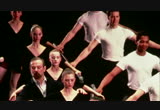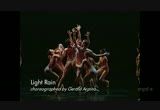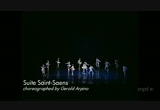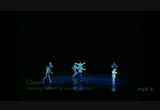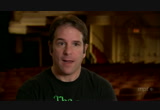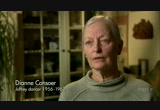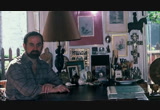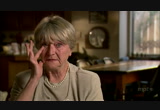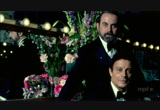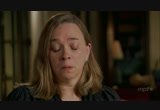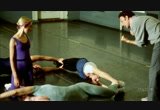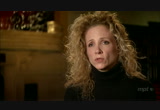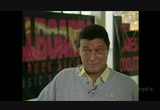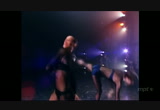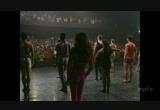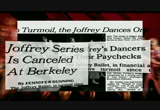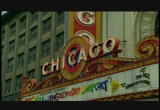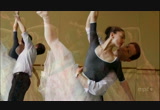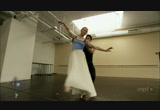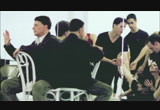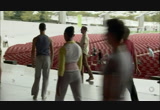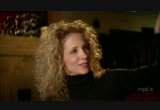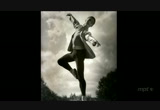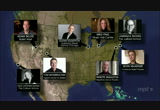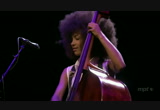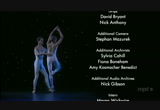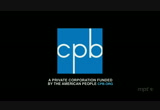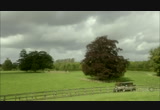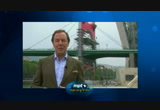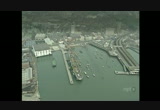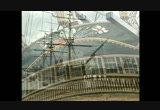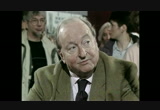tv Eyewitness 11PM News CBS December 28, 2012 11:00pm-11:35pm EST
11:00 pm
sklute: the very first time i met gerald arpino, i had just been promoted from joffrey's second company, joffrey ii into the main company. i was learning a role in "kettentanz" and i was working my darndest to be noticed. well, i got noticed. the first things mr. arpino said to me was, "hey, you with the spatulas at the end of your legs -- get outta my sight." i loved it because, you know all i could think of was he noticed me! narrator: inspired by the influx of new, young dancers, gerry arpino had another creative burst choreographing several new ballets which pleased the crowds -- but not always the critics. sklute: his work may not have been what the intelligentsia thought was great ballet. but they were great ballets! they excited audiences. they got our heartbeats going.
11:01 pm
anawalt: it's true that his works took a beating. dance critics needed to make sure that people understood gerald arpino is a b-rated choreographer and george balanchine is "a." woman: what gerry arpino did was he took the classical vocabulary and he then stretched it in a way which was very american and very modern, to be more exaggerated to be faster to be more dynamic. it was really trying to find a way to hold onto that tradition of classical ballet but to give it that modern american sensibility. kisselgoff: the thing is that, he choreographed for the moment.
11:02 pm
he was of his time. some works died very soon, but some did not. weiss: gerry was an eclectic choreographer. he didn't really have one style. at that time, ballet was the conservatory and i think by breaking out of that, he probably threatened some people, and also, frankly, there were moments when he went overboard. mckenzie: i always had a love/hate relationship
11:03 pm
with gerry in the studio. in retrospect, he broke down a "holier-than-thou" approach to ballet that i had. he said, "come on, baby, you can't be precious about this. you've just got to get down, get physical," you know. and i wasn't particularly amused by being challenged in that way. chryst: gerry would say, "gimme this, babe." and he would throw something in the air, and you'd... kind of, "okay, how about this?" "that's it!" man: he wanted a thousand percent every second and i did leave arpino rehearsals with soaking-wet shoes soaking-wet, making tracks on the floors. narrator: by 1986, robert joffrey was planning several ambitious works for his repertoire including a restaging of another diaghilev classic, nijinsky's "le sacre du printemps."
11:04 pm
he also continued to bring in new contemporary choreographers, like laura dean. at the same time, though joffrey was confronting a new challenge beyond his control an illness he was desperate to conceal. watts: rob was always rallying during his illness and always fighting back. and always very eager not to get sicker. and it was not being spoken of as a.i.d.s. -- i knew it was. we were in the middle of the epidemic of a.i.d.s. many of the dancers from the joffrey ballet had died of it earlier. consoer: i don't think bob wanted people to know he had a.i.d.s. and the hospital, obviously, cooperated. and the newspapers also. in those days, i guess you didn't talk about it so much. migdoll: if you're a close friend or family member, you never accept that death will finally come.
11:05 pm
that somehow some miraculous way, something's going to turn around. man: and we were really happy in l.a. when mr. joffrey came to the premiere of "le sacre du printemps." he was very spry. he seemed so well. and we were like "oh, he's getting better. this is great, this is great." and then that christmas we premiered "nutcracker" and he was very ill. and it was just difficult. i went to see him, he was in the hospital. and to me, what i hated was that little room. bob's apartment was so rich. it had all those paintings those books, those records. and there he was in that little room, cold. and he didn't look very good i must say and i knew that i was saying goodbye to him. arthur: my husband and i went to new york
11:06 pm
to visit him, and that was just after the new year's. and it was hard. it's still hard. sorry. and he wasn't good. and, uh... the passing was rough. um... i bent over... oh, god. and i kissed him, and obviously i must have looked like this. and he said, "don't cry, i'm fine." i said, "i'm not crying." so i kissed him and left. he was not the only one, the only gay friend i said goodbye to. so that was the end of bob for me. except, in a way it never really is.
11:07 pm
man: no more parents. he was my artistic parent. it was sad to lose your dad. it was very sad. i think it was even sadder the whole... duplicity. he died of a.i.d.s., and by then, we'd all lost friends because of a.i.d.s., so we were kind of like scratching our heads why are we getting this song and dance? arpino: when bob passed away a voice that i had worked with for so long and then suddenly not to have his presence there i became aware of myself more
11:08 pm
and what my mission was. migdoll: it was so hard for gerry because gerry was doing everything that bob used to do but by himself. he was touring with the company. keeping it alive keeping it funded. keeping the board members apprised. but there was a serious concern on the part of the board as to whether or not the company could flourish without robert joffrey. anawalt: for him to be told that he was not wanted as the director of the company was completely senseless on the part of those who were saying it. watts: we had a very long lunch. and gerry said he was being embattled. and i said, "gerry it's not worth the battle. it's not worth all of that acrimony,"
11:09 pm
and i was trying to encourage him to walk away from such ugliness. anawalt: had he not been part of the company at that point, there is no way on god's good green earth it could have gone forward not as the joffrey. but fortunately gerry had a good section of the board that was on his team. once it became a public issue in the press gerry wound up in charge. anawalt: but when he assumed the role of artistic director, the reconstructions suffered. and the company began to lean a lot on the arpino ballets because that's what they owned and that's what they owned the rights to, so the company changed. woman: i first met mr. arpino
11:10 pm
when i was in joffrey ii and i had been dancing the "nutcracker." we sort of filled in for different parts that they needed, for bigger ballets. and he saw me and gave me this look and he said, "good, baby, you're a good dancer." and i was in awe "thank you, thank you." then he said, "but try and lose a little weight if you can." for the joffrey at that time most of our work was touring. and it's very hard to fund a company that you never get to see. we rarely performed in new york anymore. that was a very difficult time for everybody. woman: there were times where we waived paychecks or let them come in late. all sorts of instances to be able to support mr. arpino. because we really believed -- i mean, he was dad, you know it was our family. we didn't want anything to happen. we wanted to do everything we could to keep it moving forward, and keep it growing. narrator: the company's financial woes resulted
11:11 pm
from the drastic decline in federal arts funding, compounded by the high cost of robert joffrey's elaborate restaging of "le sacre du printemps" and the "nutcracker." but in this dark hour, gerry arpino turned a chance meeting into financial salvation. man: he was at a function in los angeles with a longtime joffrey supporter, patricia kennedy, who introduced him to prince. arpino: the night we met -- he had never been to a ballet -- i asked him, "prince, uh... are you enjoying yourself?" and he said, "mr. arpino i'm inspired." and so the seed was planted. man: prince offered gerry the use of all of his music royalty-free. so gerry put together a full evening work. ♪ he chose four different choreographers that he felt were new and "of the scene."
11:12 pm
♪ yeah, yeah ♪ ♪ trust ♪ ♪ who do ya? ♪ ♪ trust ♪ ♪ what makes you a real lover? ♪ ♪ trust ♪ migdoll: "billboards" kept the company alive. it was a very contemporary piece. it was kind of brassy and out there. woman: it didn't appeal to everybody in the company, but we knew that this was what was keeping our jobs that this was going to create a future. ♪ [ applause ] weiss: i was very critical of "billboards." i thought it was really second-rate. i thought it was kitschy. i thought it took really amazingly
11:13 pm
trained dancers and, you know, made them "shake that thing." woman: maybe the critics had an issue with it but every single place we went there was a standing ovation. people dug it. man: i remember minneapolis, minnesota. for the last 20 minutes of the show, the audience just kept going "oooh-oooh, oooh-oooh!" and they were dancing and jumping up and down with us. it was like being a rock star. woman: and that was an amazing experience, to feel that from the stage, when the curtain would come in and you'd hear that audience just screaming. it was certainly not something you're used to hearing as a ballet dancer. man: it felt more like doing a broadway show. the management of the company decided that
11:14 pm
since they had this cash cow they could just keep running it, and we got away from the vision, and that turns away some of your funders because they see you as sort of a one-hit pony. but it certainly allowed the company to continue at a time when the company desperately needed something to keep it going. robertson: it delayed the demise of the company, i would say, rather than save it. because those financial issues didn't get resolved during the time that all of that cash was coming in. woman: there was so much in new york. fighting for a few inches in a newspaper was a really difficult thing. woman: i would have conversations with gerry and at that time he was angry, he was grieving,
11:15 pm
he was in denial about the company really collapsing and the fact that we might have to move. and there was a transition committee created by some of the key board members to figure out how to move the joffrey to chicago. i think gerry arpino resisted at first. i don't know if he trusted that the company would really start up again. we formed a chicago not-for-profit corporation. we said to what was left of the new york organization, "we will take them." and in '95, we moved them to chicago. woman: i think it was such a bold move, to say, we are going to take a company that had its roots and its identity in new york and it was going to move to a place, frankly, that was
11:16 pm
not a dance capital in any way shape or form. and they were going to really see if they could become an institution here. goldweber: the company when they got to chicago was a mess. i got there -- the day i arrived, they were in season. so i went to the theater and they didn't know the bows of what they were doing that night and people were running into each other onstage. you know, transitions are hard. so many dancers had left so there wasn't that unity of style. there were many, many dancers from all over, so we worked really hard to try and develop a unity of style to rebuild the classical technique of the company to a level where then the company could go off and do anything it wanted to just like what the company was at its greatest times. woman: so it was an issue of putting "billboards" to bed and focusing back into the heart and soul of what the joffrey was -- the arpino works the joffrey works, the timeless classics like "the green table," and whatever new works we had already
11:17 pm
made commitments to. just keep your attitude a little higher. sklute: i think it wasn't until the move to chicago that gerald arpino really became artistic director of the joffrey ballet in his own right. you know, because with the move to chicago it stopped being robert joffrey's company and it became gerald arpino's company. man: mr. arpino hadn't dabbled in a choreography in a long time. and i was home in texas, and then he calls. he says, "can you come back to chicago so you could work with maia? because i'm going to start to choreograph a pas de deux."
11:18 pm
i was like, "great. we need to do some work." arpino: with me, it's a collaboration. you work through movement, and it's that relationship between the artist and the choreographer that developed the art form, which is the important aspect of why you're there, working together. woman: i think mr. arpino's been a huge influence on me as an artist to realize that it's using one's technique as a medium for expression which all art is about. it's kind of to reflect our world back and to view it. to escape to some other place or to look at your life and kind of bring new perspectives.
11:19 pm
shives: it's a powerful piece, one of his masterpieces. i don't know if he knew it was going to be his last work. nobody knew. sagan: the slowdown was enormously painful. this was an energetic personality. lively. always there. always with you. and then he began to suffer from the things which eventually took him from us. and that was very hard. narrator: as gerry arpino's health began declining the joffrey board started a national search for his successor. in september 2007, they selected former joffrey dancer ashley wheater.
11:20 pm
1, 2, 3, 4. guys, just take two steps -- 1 and 2 and down and go. i worked with gerald arpino in australia when i was with the australian ballet. and gerry said, "you know, if you ever want to come to new york bob joffrey would really like you." and i took him up on it, so i met mr. joffrey, and he'd said "we want you to join the company." man: one of the things that's so tremendous about ashley is that he is aware -- like robert joffrey, actually -- of what's going on in the dance community worldwide. he travels constantly. he talks to people. just come to where you were. narrator: in 2008, after years of fundraising by the board, the first permanent home in the company's history joffrey tower, opened with great fanfare. it would only be fitting
11:21 pm
if this studio was named for one of the most important people. this studio is the gerald arpino studio. [ applause ] thank you. thank you very much. narrator: but sadly, just a month after the joffrey tower opening, gerry arpino died after a long illness. he was 85. i miss his bravos up in the box, you know. he was always there -- "bravo!" every performance, every performance. goldweber: and the first time i saw him, he was putting his fingers to his mouth and running behind a curtain to whistle because he was the biggest cheerleader
11:22 pm
and he wanted the audience riled up. [ applause ] robert joffrey and gerald arpino shaped my life. i mean, i was 18 when i came here. i just feel like they were in a way, almost parents to me. without them, i wouldn't be the teacher that i am today. watts: they gave me an atmosphere where i felt safe and where i felt cared for and loved. they believed in me. and it's something that i treasure for the rest of my life. my great gift was having my life intersect with theirs when i was 17. tomasson: i can honestly say
11:23 pm
those years that are spent with joffrey he was sort of opening the door to contemporary choreographers modern dance choreographers. that has influenced me tremendously as an artistic director. i will always be grateful to bob for that. gurin-paul: they believed so much in the art form. and they loved it with such a passion that nothing was going to stand in their way, and i think that's part of being a maverick -- you've got to have guts, you've got to have the grit -- they had grit. sklute: the joffrey ballet did more than just produce dance. i think you can see, across the country and across the world the amount of directors and choreographers and dancers that have all come from the joffrey ballet. weiss: you know, the joffrey really is still in the making. it's still reinventing itself. it's still creating a new image for itself. sagan: the joffrey today is in a terrific place.
11:24 pm
they have stability, they have a real home and the opportunity to grow in new work in the ballet field is right there waiting. arpino: bob had an american dream. i've been involved from the very beginning. and even before the beginning. even before the beginning. [ applause ] one tremendous thing about pbs is that it makes art accessible by putting it on a platform where millions of people can access it for free. and we need it. we need music, we need dance we need great theater -- for our soul for joy in our lives. a lot of people flip on pbs and hear or see something that wakes up that integral part of being a human being which is enjoying the arts of other human beings. so i'm grateful for pbs as an artist and as a viewer.
11:25 pm
♪ who's produced over a quarter-century of the most entertaining and compelling portraits of the artists who shaped and defined the course of american culture? ♪ i want to be ♪ ♪ he wants to be ♪ ♪ i want to be ♪ ♪ he wants to be ♪ ♪ i want to be the greatest grandest ♪ ♪ and most fabulous producer in the world ♪ you guessed it -- "american masters." ♪ he wants to dine with a duchess and a duke ♪ do i get any money for this? ♪ i just gotta be a producer ♪ ♪ to learn more about the joffrey ballet and other american masters visit pbs.org/americanmasters or find us on facebook. "joffrey: mavericks of american dance" is available on dvd for $24.99.
11:26 pm
11:27 pm
additional support for this program is provided by... and by contributions to your pbs station from viewers like you. be more. pbs. ♪ ♪ ♪ and the wind will ♪ ♪ fill my sails. ♪ ♪ still far away ♪ bates: you never doubted. ♪ from where i belong ♪ anna: no ♪ but it's always darkest ♪ thomas: i'm warning you. ♪ before the dawn ♪ mary: don't you see what this means?
11:28 pm
♪ i know ♪ mary: you're not on our side! ♪ no matter what it takes ♪ ♪ i'm coming home ♪ martha: downton still stands and the crawleys are still in it. ♪ tell the world i'm coming. . .♪ ♪ i'm coming home ♪ ♪ i'm coming home ♪ ♪ tell the world i'm coming home ♪ mary: come and see what we've done. ♪ my kingdom awaits ♪ ♪ and they've forgiven my mistakes ♪ ♪ i'm coming home ♪ matthew: i need to kiss you. very much. ♪ tell the world i'm coming home ♪ the critics love call the midwife "pbs could have another downton abbey on it's hands..." beautiful little girl... and watch for season two of call the midwife coming in march only on pbs
11:30 pm
11:31 pm
is a very potent and a very powerful one. in the age of sail, the women of portsmouth would come down here to the harbour mouth, never knowing when the ships of their husbands or lovers would return; they might wait for a week, a month, a year, and sometimes, of course, their men never came back. portsmouth's great maritime heritage is now preserved within the historic dockyard the finest collection of ships and naval memorabilia anywhere in the world. the tudor warship, mary rose was salvaged in 1982 and now faces a 20-year restoration program. next to her is nelson's famous flagship, hms victory the lasting memorial of nelson's own victory at trafalgar more than 50 years before this other great ship was built. hms warrior was launched in 1860 and revolutionised naval strategy. she was the first iron hulled warship anywhere in the world. she could outrun and outgun anything else afloat; as a result of that, she was never challenged.
11:32 pm
in the middle of the 19th century, warrior was the ultimate deterrent. the best way of tracing the ancestry of these ships is through the development of the docks and workshops that supported them. from the building of the first-ever dry dock in 1495, portsmouth dockyard can claim many firsts, and by the end of the 18th century it was the largest industrial site in the world. there were founders, fitters, polishers, rope makers, joiners, riveters. generations of families worked in the dockyard it was a town within a city with its own schools a church, shops, a fire station, and, most important of all factories that could take on virtually any kind of engineering work. the dockyard's fortunes have risen and sometimes fallen with those of the navy and although the last warship was built here in 1967 the historic dockyard keeps its close association with the royal navy. our venue for the roadshow is boathouse no. 7 where some of the smaller vessels in the navy have been built and
11:33 pm
restored. now it's a museum and very much part of the heritage center. there are lots of familiar faces among our experts today. you'll recognise david battie and henry sandon on the pottery and porcelain tables. looking out for interesting oils and watercolours, we have peter nahum and mark poltimore. our expert on books, letters and documents is clive farahar. covering a wide variety of collectables, we have victorian leatham. so let's now join our experts with the people of portsmouth. it's a wonderful name, this john bull emery. is this family? only to the extent that emery, the surname, is. my third name is emery and my father's second name was emery, and he is a collateral. i don't think he's a direct. but it's come down through the family? i've known it all my life. my father had it all his life. i don't know beyond that because i never knew my grandfather --
11:34 pm
either of my grandfathers. they were married late. it goes back a good bit further than that. we've actually got on the inside here the famous worcester manufacture chamberlain. they were one of the big manufactures. they were taken over by what eventually became the royal worcester factory, but they made very fine quality wares. it's unusual to find a sugar box of this type. "east india sugar not made by slaves." i think that is just to make it absolutely sure. anything connected with slavery is very collectable. the full inscription here says "to john bull emery esq., the jealous advocate for the emancipation of slaves." it's got a wonderful ring to it. i can't remember whether he was in parliament at the time, during the wilberforce business, or whether -- i think some of them were, some of them not.
1,142 Views
1 Favorite
IN COLLECTIONS
WJZ (CBS) Television Archive
Television Archive  Television Archive News Search Service
Television Archive News Search Service 
Uploaded by TV Archive on

 Live Music Archive
Live Music Archive Librivox Free Audio
Librivox Free Audio Metropolitan Museum
Metropolitan Museum Cleveland Museum of Art
Cleveland Museum of Art Internet Arcade
Internet Arcade Console Living Room
Console Living Room Books to Borrow
Books to Borrow Open Library
Open Library TV News
TV News Understanding 9/11
Understanding 9/11